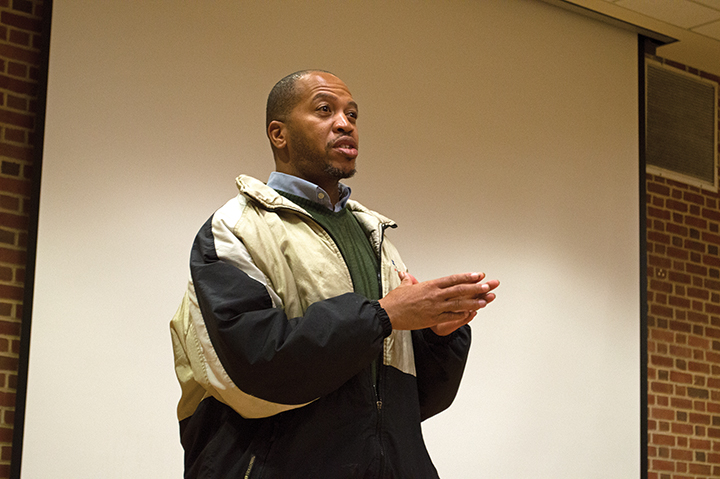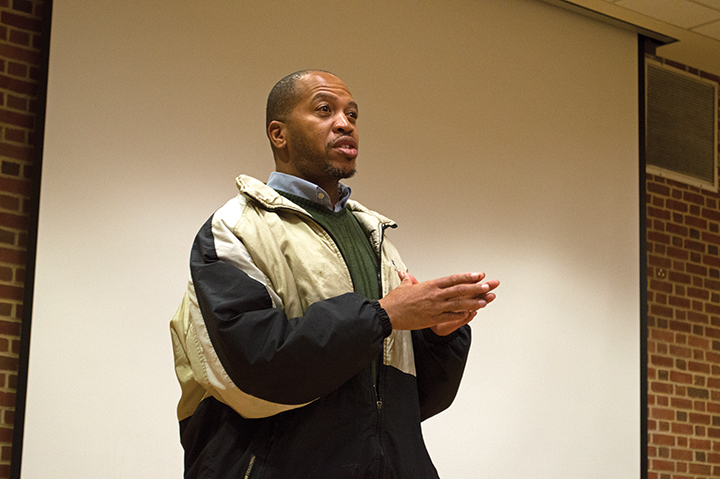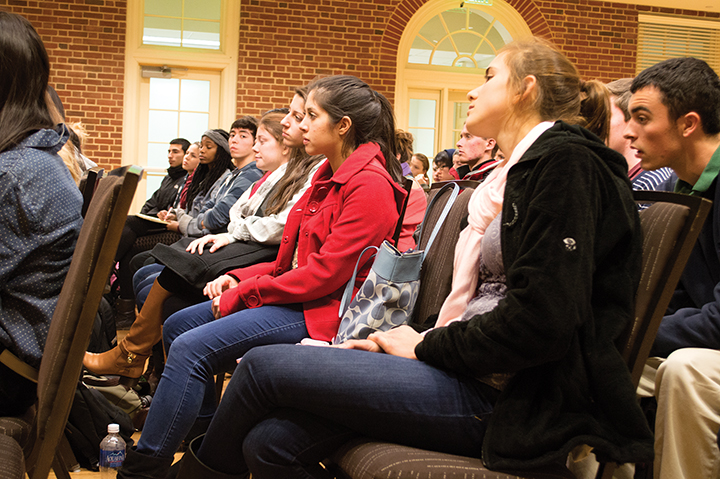When Jeffery McNeil was 6 years old, he and his father walked by a homeless woman muttering to herself on the street. As he watched her shiver in the 23-degree weather, McNeil thought: That has to be the worst thing that could happen to a person. It will never happen to me.
He was wrong.
McNeil, along with two other formerly homeless people, spoke to a group of about 50 students in the Prince George’s Room at Stamp Student Union last night about the common misconceptions surrounding homelessness in America.
“When I was younger I thought there was no way I’d ever end up homeless,” said McNeil, who grew up in a middle-class family. “I’d see homeless people and think, ‘Why don’t you get a f—ing job. You’re a loser.’ I had no sympathy for them.”
The event aimed to correct attitudes like those held by a younger McNeil and spread the message that no one is immune to homelessness.
McNeil came from a traditional family and was honorably discharged from the Navy before being diagnosed with bipolar disorder and becoming an alcoholic. Gwynette Smith, another speaker, worked as a lawyer in New York before succumbing to drugs. Alan Banks, the final panelist, worked for the State Department, making more than $100,000 before depression started dictating his decisions.
“When I talk to students, a lot of them get this look in their eyes that says, ‘This can’t happen to us, we have money,’” Banks said. “Homelessness doesn’t care how much money you have, about what color you are, where you live. It will come get you. I had a house built over Chesapeake Bay, a car, a medium-sized boat — look what happened to me.”
Inanna Felton, a sophomore Chinese major, said Banks’ story deeply affected her because the chemical imbalances in his brain that led to his depression were out of his control.
“There was nothing he could really do about it, and it really destroyed every aspect of his life,” Felton said.
Banks and his wife divorced after 19 years of marriage because his depression didn’t allow him to truly give all of himself to his marriage, he said. Shortly after, his father died. He retreated under the covers and eventually lost his job.
His next step: the streets of Washington.
Because of his depression and severe introversion, Banks said he didn’t speak for the first three months of his six-year saga of homelessness. He didn’t realize how bad it was until he laughed while reading the newspaper and turned around to see who had made the noise.
“I was shocked at the sound of my own voice,” he said. “My illness was talking a lot louder than I was.”
He once went three months without a shower and four days without eating.
“You don’t know hunger until you put something in your mouth and you can hear your stomach grind it up,” he said. “I resorted to eating what other people threw away, which is not as bad as it sounds because we as Americans throw away tons of food every day.”
He remembers the time he took some chocolate chip cookies a group of schoolchildren on a field trip had thrown away, still perfectly wrapped. Overnight, ants attacked his stash.
“In my old life, I would’ve seen the ants and walked away, but in this brave new world, I went to war with the ants,” he said. “I ate the cookies anyway — someone told me ants have protein in them, so it was a win-win.”
Finding a job was difficult because he earned one strike for his clothing, a second strike for the stereotypes surrounding homelessness and a third strike for not having a phone to follow up with potential employers. Eventually, however, he secured a job and an apartment.
But a man with a gun set him back once more. He was robbed outside of his apartment on Dec. 4, 2006. His attacker shot him three times — in his right hand, left arm and left wrist. All the money he had saved went to paying for four surgeries.
He was homeless again. And that, he said, was when he hit rock bottom.
While living on the third floor of a homeless shelter, Banks debated how best to kill himself. Should he sit on the edge of the roof and push off? Or dive headfirst?
Instead, he decided to seek help and stick with therapy. In December, he will celebrate his fifth Christmas reunited with his two children — a turn of events he attributes to God.
“I can see the times God carried me when I couldn’t carry myself. I didn’t starve. I didn’t freeze. I survived getting shot on both sides of my body,” said Banks, as his three silver cross necklaces reflected light. “I believe God has a plan for everybody’s life and his plan for mine is to be here speaking to you, and he wanted me to know what I was talking about.”
Before he shared his story, Banks asked the audience to shout out one-word negative stereotypes associated with the homeless community.
The crowd offered the words “lazy,” “addicted,” “uneducated,” “dangerous” and “manipulative.”
“By show of hands, how many of you know someone who lives in a home with those qualities?” Banks asked. “Those words are part of the human condition, not the homeless condition. I want to open people’s eyes and minds, and knock down the misconceptions about who can become homeless and what the causes are.”
The speakers all agreed the best thing students can do for homeless people is treat them as human beings. The most precious gifts they received while living on the streets were eye contact and a “good morning.” McNeil urged audience members to just have conversations with homeless people.
“They’re not aliens from outer space,” McNeil said. “They’re people who fell on bad luck.”
Felton said she’ll remember that advice next time she goes into Washington with her friends.
“I thought the best thing to do was just giving homeless people money,” she said. “But today I learned the best thing to do is give eye contact and hope to hold on to.”
McNeil exemplifies that hope. He hasn’t had a drink in four years, and after getting involved with the D.C.-based newspaper, Street Sense, which exists to support the homeless, has been published in The New York Times.
“Today, I am no longer homeless,” he said. “Today, I have empathy for the poor.”
Jeffery McNeil at the Faces of Homelessness panel in the Prince George’s Room in Stamp Student Union on Thursday night.
Attendees at the Faces of Homelessness panel in the Prince George’s Room in the Stamp Student Union on Thursday night.





